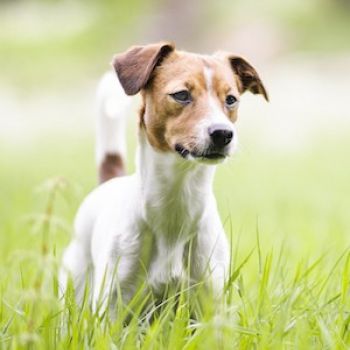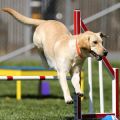The Danish-Swedish Farmdog, also known as the Dansk-Svensk Gårdshund, is a small to medium-sized breed that originated in Denmark and Sweden. This versatile and energetic dog is highly valued for its working abilities and friendly nature. With its compact and muscular build, the Danish-Swedish Farmdog is well-suited for a variety of tasks, making it a popular choice among farmers and hunters.
The history of the Danish-Swedish Farmdog can be traced back to the 18th century when it was developed as a multi-purpose farm dog. It is believed to be a result of crossbreeding between local terrier-type dogs and various European hunting breeds. The breed was primarily used for hunting vermin, herding livestock, and guarding the farm.
According to the Fédération Cynologique Internationale (FCI) typology, the Danish-Swedish Farmdog belongs to Group 3 - Terriers. This group includes small to medium-sized dogs that were originally bred for hunting and vermin control. The breed is classified under Section 2 - Small-sized Terriers.
The Danish-Swedish Farmdog is known for its friendly and outgoing personality, making it an excellent companion and family dog. It is highly intelligent, trainable, and eager to please, which makes it suitable for various dog sports and activities. This breed is also known for its strong prey drive and may not be suitable for households with small pets.
In terms of physical characteristics, the Danish-Swedish Farmdog is a small to medium-sized dog with a well-muscled body. The average height for males is around 13-15 inches (33-38 cm), while females are slightly smaller, measuring 12-14 inches (30-36 cm) in height. The weight of this breed typically ranges from 15-25 pounds (7-11 kg).
The Danish-Swedish Farmdog has a short and dense double coat that provides protection from the elements. The coat color can vary, but the most common colors are white with black or brown markings. The breed requires regular grooming, including brushing to remove loose hair and occasional bathing to keep the coat clean.
With proper care and nutrition, the Danish-Swedish Farmdog has a relatively long lifespan of around 12-15 years. However, like any breed, they may be prone to certain health issues, including hip dysplasia, patellar luxation, and allergies. Regular veterinary check-ups and a balanced diet are essential to ensure their overall well-being.
One interesting fact about the Danish-Swedish Farmdog is its exceptional agility and athleticism. This breed excels in various dog sports, including agility, obedience, and tracking. Their high energy levels and intelligence make them quick learners and enthusiastic participants in these activities.
In conclusion, the Danish-Swedish Farmdog is a versatile and energetic breed that has a rich history as a working farm dog. With its friendly nature and trainability, it makes an excellent companion and family pet. Whether it's herding livestock, hunting vermin, or participating in dog sports, this breed is always up for a challenge. With proper care and training, the Danish-Swedish Farmdog can bring joy and companionship to any household.
The Danish-Swedish Farmdog, also known as the Dansk-Svensk Gårdshund, is a small and versatile breed that originated in Denmark and Sweden. These dogs are known for their lively and friendly nature, making them excellent companions and working dogs. With their unique character traits, they require proper training and socialization to thrive in various environments.
In terms of behavior, Danish-Swedish Farmdogs are highly intelligent and eager to please their owners. They are known for their alertness and make excellent watchdogs, always ready to sound the alarm if they sense any potential danger. Despite their small size, they possess a fearless and confident demeanor, which makes them suitable for various tasks such as herding, hunting, and even participating in dog sports.
These dogs are known for their sociable nature and get along well with children and other pets when properly introduced. They thrive on human companionship and enjoy being a part of the family. However, they can be reserved with strangers and may require early socialization to prevent any potential shyness or aggression.
When it comes to raising and training a Danish-Swedish Farmdog, consistency and positive reinforcement are key. These dogs are highly trainable due to their intelligence and eagerness to please. They respond well to reward-based training methods, such as treats, praise, and playtime. Harsh training methods or punishment can be counterproductive and may lead to fear or anxiety in these sensitive dogs.
Early socialization is crucial for Danish-Swedish Farmdogs to ensure they grow up to be well-rounded and confident adults. Exposing them to various people, animals, and environments from a young age will help them develop into friendly and adaptable dogs. Puppy classes and obedience training are highly recommended to provide them with the necessary skills and manners.
Exercise is essential for Danish-Swedish Farmdogs to keep them physically and mentally stimulated. They have a moderate energy level and require daily walks, playtime, and interactive toys to prevent boredom. Engaging them in activities such as agility, obedience, or scent work can also help channel their energy and provide mental stimulation.
Despite their small size, Danish-Swedish Farmdogs have a strong prey drive and may chase small animals. It is important to keep them on a leash or in a securely fenced area to prevent any accidents or escapes. Additionally, providing them with mental stimulation through puzzle toys or interactive games can help satisfy their natural instincts.
In conclusion, Danish-Swedish Farmdogs are lively, friendly, and intelligent dogs that make wonderful companions and working dogs. They require proper training, socialization, and exercise to thrive in various environments. With their alertness, sociability, and versatility, they can excel in various activities and become cherished members of any family.
The Danish-Swedish Farmdog, also known as the Dansk-Svensk Gårdshund, is a small to medium-sized breed that originated in Denmark and Sweden. These dogs are known for their lively and energetic nature, making them great companions for active individuals or families. To ensure the well-being and happiness of your Danish-Swedish Farmdog, it is important to provide them with proper care and attention. Here are some tips on how to care for dogs of this breed:
1. Exercise: Danish-Swedish Farmdogs are highly active and require regular exercise to keep them physically and mentally stimulated. Aim for at least 30-60 minutes of exercise daily, which can include walks, runs, playtime in a securely fenced yard, or engaging in dog sports such as agility or obedience training.
2. Mental Stimulation: In addition to physical exercise, these dogs thrive on mental stimulation. Provide them with interactive toys, puzzle games, and training sessions to keep their minds engaged. This will help prevent boredom and destructive behavior.
3. Socialization: Danish-Swedish Farmdogs are social animals and enjoy the company of their human family members. It is crucial to socialize them from a young age to ensure they are comfortable around other dogs, animals, and people. Expose them to various environments, sounds, and experiences to build their confidence and prevent fear or aggression issues.
4. Training: These dogs are intelligent and eager to please, making them relatively easy to train. Use positive reinforcement techniques such as treats, praise, and rewards to motivate and encourage good behavior. Consistency, patience, and firm but gentle guidance will help them become well-behaved companions.
5. Grooming: Danish-Swedish Farmdogs have a short, dense coat that requires minimal grooming. Regular brushing with a soft-bristle brush or grooming mitt will help remove loose hair and keep their coat in good condition. Bathe them as needed, usually every few months or when they get dirty. Additionally, trim their nails regularly, check their ears for any signs of infection, and brush their teeth to maintain good oral hygiene.
6. Health Care: Like all dogs, Danish-Swedish Farmdogs require routine veterinary care. Ensure they are up to date on vaccinations, flea and tick prevention, and heartworm medication. Schedule regular check-ups to monitor their overall health and address any concerns promptly. It is also recommended to spay or neuter your dog unless you plan on breeding them responsibly.
Now, let's discuss some things to avoid when caring for Danish-Swedish Farmdogs:
1. Lack of Exercise: These dogs have high energy levels, and insufficient exercise can lead to restlessness, anxiety, and destructive behavior. Avoid confining them for long periods without exercise or mental stimulation.
2. Harsh Training Methods: Danish-Swedish Farmdogs respond best to positive reinforcement training techniques. Avoid using harsh or punitive methods as it can damage their trust and hinder their learning process.
3. Neglecting Socialization: Failing to properly socialize your Danish-Swedish Farmdog can lead to fearfulness, aggression, or anxiety. Avoid isolating them from new experiences, people, or animals.
4. Overfeeding: These dogs have a tendency to gain weight if overfed or not provided with a balanced diet. Avoid excessive treats and monitor their food intake to maintain a healthy weight.
5. Ignoring Dental Care: Dental hygiene is essential for the overall health of your dog. Neglecting regular teeth brushing or professional dental cleanings can lead to dental diseases. Avoid dental issues by implementing a dental care routine.
By following these tips and providing the recommended care, you can ensure that your Danish-Swedish Farmdog remains happy, healthy, and well-adjusted. Remember, each dog is unique, so always pay attention to their individual needs and consult with a veterinarian for personalized advice.
The Danish-Swedish Farmdog, also known as the Dansk-Svensk Gårdshund, is a small to medium-sized breed that boasts a charming and distinctive coat color. The common color of Danish-Swedish Farmdog dogs is a striking combination of white and black, creating a visually appealing and eye-catching appearance.
The base color of the Danish-Swedish Farmdog's coat is predominantly white, which serves as a canvas for the contrasting black markings. The white fur is usually clean and bright, giving the dog a crisp and clean appearance. It covers the majority of the body, including the chest, belly, legs, and tail. This white base color not only adds to the dog's overall elegance but also provides a sense of purity and innocence.
The black markings on the Danish-Swedish Farmdog are what truly make this breed stand out. These markings are typically found on the head, ears, back, and sometimes on the tail. The black color is deep and rich, creating a stark contrast against the white background. The markings can vary in size and shape, ranging from small patches to larger areas of black. Some dogs may have symmetrical markings, while others may have more irregular patterns, adding to the uniqueness of each individual.
In addition to the white and black coloration, it is not uncommon to find tan or brown markings on the Danish-Swedish Farmdog. These markings are often seen on the face, particularly around the eyes and muzzle. The tan color adds warmth and depth to the overall appearance of the dog, complementing the black and white contrast.
The coat of the Danish-Swedish Farmdog is short and dense, providing protection and insulation against various weather conditions. This low-maintenance coat is easy to groom and requires minimal effort to keep it looking its best. Regular brushing helps to remove loose hairs and keep the coat clean and healthy.
The coloration of the Danish-Swedish Farmdog's coat not only enhances its physical beauty but also reflects the breed's history and purpose. Originally bred as a versatile farm dog, the contrasting colors of white and black allowed them to be easily distinguished from livestock while working in the fields. This coloration also helped them blend in with their surroundings, making them efficient hunters and vermin exterminators.
In conclusion, the common color of Danish-Swedish Farmdog dogs is a captivating combination of white and black. The white base coat serves as a backdrop for the striking black markings, creating a visually appealing and elegant appearance. The addition of tan or brown markings adds depth and warmth to the overall coloration. This unique coat color not only enhances the breed's physical beauty but also reflects its historical purpose as a versatile farm dog.
The Danish-Swedish Farmdog, also known as the Dansk-Svensk Gårdshund, is a small to medium-sized breed originating from Denmark and Sweden. These dogs are known for their high energy levels, intelligence, and friendly nature. When it comes to their health, they are generally a robust and healthy breed with a few common health issues to be aware of.
One of the most common health concerns in Danish-Swedish Farmdogs is hip dysplasia. This is a genetic condition where the hip joint doesn't develop properly, leading to pain, lameness, and arthritis. Regular exercise, a balanced diet, and maintaining a healthy weight can help reduce the risk of hip dysplasia. Responsible breeders often screen their breeding dogs for this condition to minimize its occurrence in the breed.
Another health issue that can affect Danish-Swedish Farmdogs is patellar luxation. This occurs when the kneecap slips out of its normal position, causing discomfort and difficulty in walking. Regular veterinary check-ups can help detect this condition early on, and in severe cases, surgical intervention may be required.
Like many small to medium-sized breeds, Danish-Swedish Farmdogs can also be prone to dental problems. Regular dental care, including brushing their teeth and providing appropriate chew toys, can help prevent dental diseases such as periodontal disease and tooth decay.
Eye problems, such as progressive retinal atrophy (PRA) and cataracts, can also occur in Danish-Swedish Farmdogs. PRA is a degenerative disease that leads to vision loss, while cataracts cause clouding of the lens. Regular eye examinations by a veterinarian can help detect these conditions early on, and in some cases, surgery may be necessary to restore vision.
To ensure the overall health and well-being of Danish-Swedish Farmdogs, it is essential to provide them with a balanced diet that meets their nutritional needs. High-quality dog food, appropriate for their age and activity level, should be fed in the right portions to prevent obesity. Regular exercise is crucial for these energetic dogs to maintain a healthy weight and mental stimulation. Daily walks, playtime, and training sessions can help keep them physically and mentally fit.
Regular veterinary check-ups are essential for early detection of any potential health issues. Vaccinations, parasite prevention, and routine blood tests are part of a comprehensive healthcare plan for Danish-Swedish Farmdogs. Spaying or neutering is also recommended unless the dog is intended for breeding purposes.
Grooming is relatively low-maintenance for Danish-Swedish Farmdogs. They have a short, dense coat that requires regular brushing to remove loose hair and prevent matting. Bathing should be done as needed, typically every few months, to keep their coat clean and healthy.
In conclusion, Danish-Swedish Farmdogs are generally a healthy breed with a few common health issues to be aware of. Regular veterinary care, a balanced diet, exercise, and proper grooming are essential for maintaining their overall health and well-being. Responsible breeding practices, including health screenings, can help minimize the occurrence of genetic conditions in this breed. With proper care, these dogs can live long, happy, and healthy lives.
The Danish-Swedish Farmdog, also known as the Dansk-Svensk Gårdshund, is a small to medium-sized breed known for its agility, intelligence, and friendly nature. To ensure the optimal health and well-being of these dogs, it is crucial to provide them with a balanced and nutritious diet. Here is an extensive description of the nutrition requirements for Danish-Swedish Farmdog dogs, along with advice on feeding and what to avoid.
Protein is an essential component of a dog's diet, and Danish-Swedish Farmdogs are no exception. High-quality animal-based proteins should make up the majority of their diet. These can be sourced from lean meats like chicken, turkey, beef, and fish. Including organ meats like liver and heart can also provide additional nutrients. It is important to ensure that the meat is cooked thoroughly to eliminate any potential bacteria or parasites.
Carbohydrates are another important part of a balanced diet for Danish-Swedish Farmdogs. Opt for complex carbohydrates such as whole grains, sweet potatoes, and brown rice. These provide a steady release of energy and are rich in fiber, aiding in digestion. Avoid simple carbohydrates like white rice or refined grains, as they can cause spikes in blood sugar levels.
Fats are a valuable source of energy and play a crucial role in the absorption of fat-soluble vitamins. Incorporate healthy fats into your dog's diet through sources like fish oil, flaxseed oil, and coconut oil. These fats contain omega-3 and omega-6 fatty acids, which promote a healthy coat, skin, and overall well-being.
Fruits and vegetables are excellent additions to a Danish-Swedish Farmdog's diet. They provide essential vitamins, minerals, and antioxidants. Some safe options include carrots, green beans, blueberries, and apples. However, it is important to avoid feeding dogs grapes, raisins, onions, garlic, and avocados, as these can be toxic to them.
While it is tempting to share human food with your dog, it is crucial to avoid certain foods that can be harmful to Danish-Swedish Farmdogs. Some common foods to avoid include chocolate, caffeine, alcohol, sugary treats, salty snacks, and foods containing artificial sweeteners like xylitol. These can lead to various health issues, including gastrointestinal upset, pancreatitis, and even toxicity.
Feeding guidelines for Danish-Swedish Farmdogs can vary depending on their age, weight, activity level, and overall health. It is recommended to consult with a veterinarian to determine the appropriate portion sizes and feeding frequency for your specific dog. Generally, dividing their daily food intake into two or three meals is ideal to prevent overeating and aid digestion.
In addition to a well-balanced diet, fresh and clean water should always be available for Danish-Swedish Farmdogs. Hydration is crucial for their overall health and helps maintain proper bodily functions.
In conclusion, Danish-Swedish Farmdogs require a diet that is rich in high-quality proteins, complex carbohydrates, healthy fats, and a variety of fruits and vegetables. Avoid feeding them toxic foods and consult with a veterinarian to determine the specific nutritional needs of your dog. By providing a balanced and nutritious diet, you can ensure that your Danish-Swedish Farmdog remains healthy, active, and happy for years to come.






